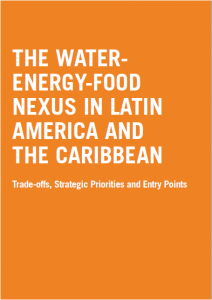In our hyper-connected world, water, energy and food are increasingly interdependent. In Latin America and the Caribbean (LAC), water is at the heart of this nexus and underpins hydropower generation, agricultural production and industry.
For Latin America and the Caribbean to meet its ambitious economic, environmental and social targets, such as those set out under the forthcoming Sustainable Development Goals and UNFCCC climate agreement, nexus thinking will be a prerequisite for success. Not as an emergency response to solve crises as they occur, but as an established approach to address challenges and opportunities in a hyper-connected landscape: to identify and resolve trade-offs, foster synergies, and optimise outcomes across different actors and sectors.
The Water-Energy-Food Nexus in Latin America and the Caribbean presents key trade-offs, strategic priorities and entry points for the nexus approach, substantiated with case studies from Brazil, Peru and Colombia.


